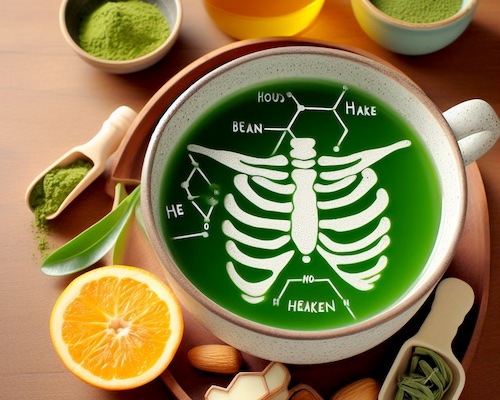
As our bones and joints wear down with age and rebuilding them becomes harder and slower for the body’s regeneration process, it is essential to maintain healthy bones and joints through active lifestyle and right nutrients. Matcha can be an indispensable part of our daily healthy routine and can greatly assist in keeping our bones, joints and tissues stronger for longer.
Health stores and coffee shops are now offering matcha shots, lattes, teas, and desserts as popular choices.
Matcha is derived from the camellia sinensis plant, just like green tea. Nevertheless, it undergoes a distinctive cultivation process and possesses a unique set of nutrients. Producers harvest the leaves, steam, and dry the leaves, remove the stems and veins, and grind the remaining leaves into a smooth, fine powder, which is known as matcha. Matcha contains higher levels of caffeine, antioxidants (EGCG) and amino acids (L-theanine) than what is typically found in green tea, encompassing the full spectrum of nutrients from the entire tea leaf.
Unlocking the Bone-Boosting Potential of Matcha Green Tea: The Impact of 2 Cups of Matcha a Day on Bone Health
As we age, our bodies undergo natural transformations, which include the continuous cycle of bone tissue breakdown and regeneration. Yet, this rebuilding process becomes progressively challenging with age, especially for women post-menopause, and individuals with autoimmune disorders, who face an elevated risk of developing conditions such as osteoarthritis and osteoporosis. Those who rely on steroids to manage specific ailments are also at a higher risk of bone loss.
So, how does the regular consumption of matcha green tea contribute to the fortification of bones and overall bone health? Continue reading to explore how drinking 1-2 cups of matcha daily could combat osteoporosis and reduce the incidence of bone fractures.
The Potential for Japanese Matcha Powder to Reduce the Risk of Bone Fractures
According to research recommendations, to lower your chances of experiencing bone fractures, consuming 2-3 cups of Japanese green tea daily is advisable. Findings from the Mediterranean Osteoporosis Study indicate that individuals who drink up to three cups of green tea daily witnessed a 30% decrease in the risk of hip fractures, regardless of gender, if they were over 50.
The study also reveals that drinking just one cup of green tea daily can reduce the risk by approximately 9%. However, by incorporating three cups of green tea into your daily routine, you could potentially decrease your risk of suffering from bone fractures by nearly one-third.
Matcha offers much high concentration of green tea nutrients and hence can provide these benefits in smaller quantities.
Matcha Green Tea: A Rich Source of Catechins and Their Impact on Bone Health
Catechins, alternatively known as flavanols or tannins, represent various polyphenols. Notably, the tea plant leaves boast a higher catechin content than any other plant, with EGCG emerging as the predominant catechin in green tea and various tea types.
These catechins, a specific subset of polyphenols, have demonstrated their ability to regulate bone resorption in osteoclasts. Matcha, mainly, is abundant in EGCGs, which hold promise in mitigating bone metabolic disorders.
Furthermore, EGCG has been found to stimulate the activation of a crucial enzyme essential for promoting bone growth and strength.
Matcha Benefits for Holistic Health
Rich in antioxidants
Matcha is abundant in catechins, a group of plant compounds found in tea that serve as natural antioxidants. These antioxidants are crucial in stabilizing harmful free radicals, compounds capable of harming cells and contributing to chronic diseases. A study demonstrated that administering matcha supplements to mice reduced the damage caused by free radicals and boosted antioxidant activity.
Help Combat Depression
A study involving Japanese workers aged 20 to 68 discovered that individuals who consumed more than four cups of green tea daily had a 51% reduced likelihood of experiencing anxiety disorder symptoms compared to those who drank less than one cup per day. This effect remained significant even after adjusting for other influencing factors.
These findings suggest a potential link between green tea consumption and a lower risk of depression and anxiety disorders. However, further research is needed to explore this relationship more comprehensively.
Healthy bones
A study conducted among postmenopausal women in Korea revealed that those who had not included any green tea in their diet or consumed less than one cup per day in the past year were more inclined to experience decreased bone density in their spine or thigh compared to those who had a daily habit of drinking green tea three times a day
Additional research suggests that tea consumption is associated with a lowered risk of osteoporosis. Immensely helping the elderly population into old age plays a role in averting bone loss and promoting the formation of bone tissue.
Side effects
Even though matcha offers potential health advantages, consuming it in moderation is advisable. Matcha has a higher caffeine content than green tea, and excessive caffeine intake can lead to undesirable effects, including an elevated heart rate.
The acceptable amount of matcha powder that a person can comfortably consume may vary from one individual to another. It’s wise to practice moderation when incorporating matcha into your diet.
Summary
In summary, matcha is a potent source of antioxidants with various potential health advantages. Using matcha powder for green tea can positively impact bone density and prevent chronic bone diseases, specifically over the age of 50. Matcha can also help in cholesterol levels, blood pressure, and anxiety disorders. However, due to its caffeine content, high concentration of nutrients and possible interactions with medications, it’s advisable to consult your healthcare provider to determine if incorporating this matcha aligns with your specific health objectives.





